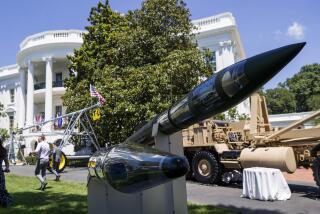Britain Sending Famed ‘Desert Rats’ to Join Gulf Force : Military: 7th Armored Brigade fought Nazis in World War II. London’s message to Iraq’s Hussein: He will lose.
- Share via
LONDON — In its largest deployment of tanks and artillery since World War II, Britain announced Friday that it is sending a full armored brigade to Saudi Arabia as a message to Iraqi President Saddam Hussein that “one way or the other he will lose.”
“Iraq’s evil aggression must be reversed,” Defense Secretary Tom King said in announcing the decision to deploy the famed 7th Armored Brigade.
It includes 120 Challenger main battle tanks, more than 6,000 ground troops, a field artillery regiment with 155-millimeter self-propelled guns, an armored infantry battalion equipped with scores of armored cars and tanks, and accompanying squadrons of attack and patrol helicopters.
The move is the largest single military contribution to the multinational force opposing Iraq after that of the United States. King told reporters he hoped it would lead other Western European countries to consider making a similar commitment.
King emphasized that Britain, while it favors a peaceful settlement of the crisis, is fully prepared to join in an allied military operation against Iraq if the U.N. sanctions fail to drive Iraqi troops out of Kuwait.
Britain decided to increase its military commitment, he said, because “now, clearly, there is a case for reinforcement.”
The armored brigade will join three squadrons of jet fighters, 12 warships and 3,000 ground personnel that Britain already has in the gulf region. King said it is meant “to make it quite clear to Saddam Hussein . . . that one way or another they will have to leave Kuwait, and that they better do it sooner than later.”
King made it clear that deployment of the 7th Brigade, the “Desert Rats” of the North African campaign in World War II, will take weeks or months to complete. Just the voyage out to Saudi Arabia will take three weeks, he said.
The logistics are further complicated by the fact that the Royal Navy does not have the ships to transport the brigade. King said the government will hire ships, but defense analysts in London said that many such vessels have already been hired by the U.S. military.
“I just can’t answer that at the moment,” the defense secretary said when asked to be more specific about the timing of the operation. He appealed to the media “to appreciate the scale of the operation.”
King was questioned closely about the cost of Britain’s commitment to the gulf campaign. Last week he told the House of Commons that Britain was spending $2 million a day, in addition to an initial outlay of $150 million for deployment, on its fighter and naval squadrons and limited ground forces. The new force, he said, will raise the maintenance cost to at least $4 million a day.
So far, Prime Minister Margaret Thatcher’s firm stand against Iraq’s conquest of Kuwait has received strong public and political support. Opinion polls have shown a steady increase in the popularity of both the prime minister and her Conservative Party.
Even the opposition Labor Party has given Thatcher its backing in the gulf crisis. Labor leader Neil Kinnock said Thursday that “we now have a noose around Saddam Hussein’s Iraq, and that noose must stay tight.”
The gulf crisis has become a highly emotional issue here. According to U.N. figures, Iraq is holding at least 220 Britons at strategic targets in Iraq and Kuwait, twice the known number of Americans held in this way. Thousands of other Britons are either hiding in Kuwait or are prevented from leaving Iraq.
More to Read
Sign up for Essential California
The most important California stories and recommendations in your inbox every morning.
You may occasionally receive promotional content from the Los Angeles Times.










